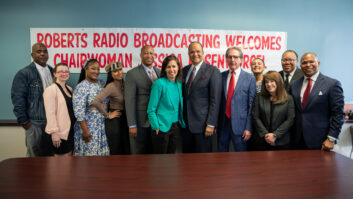GeoBroadcast Solutions is defending its proposed geo-targeting system for the FM band and says its additional planned tests will only add to a technical record that supports the idea.
As we’ve reported, the company wants the Federal Communications Commission to modify FM booster rules to allow stations to transmit very localized content for three minutes per hour independent of signals of the booster’s primary station.
Filing reply comments in the FCC’s proceeding, GBS lamented “exaggerated speculations” made by the National Association of Broadcasters and some large radio groups about the potential for increased interference and damage to FM’s business model from its ZoneCasting system.
GBS made four main arguments in its filing: that the technical data doesn’t support the claims of opponents about interference and performance in transition areas; that ZoneCasting won’t affect the EAS system; that its system will not cause a “race to the bottom” or “redlining”; and that its demonstrations in San Jose and San Francisco will further support its claims.
“Our efforts to improve radio technology and provide an economic lifeline to broadcasters competing on a daily basis against less regulated mediums, met surprising opposition from those we had hoped would embrace the opportunity to work with us and build new economic models that would help the industry remain competitive,” said Robert Udowitz, a spokesperson for GeoBroadcast Solutions.
The company said it continues to work with groups, stations, advertisers and industry organizations in the rule process; and it indicated that it would welcome having engineering representatives from large radio groups visit to view the testing process.
It told the FCC that it had expected its proposal to be “just a small adjustment of a technical rule.” However, “What we have seen over the last 10 months is that, while the rule change may be minor, the implications of radio stations having just the option to geo-target content is somehow troubling to parts of the radio industry that apparently do not want other radio stations to have even the option to innovate and compete in new ways,” GBS wrote in its reply to the FCC.
Beasley Media Group, Cumulus Media, Entercom Communications and iHeartMedia are among the radio groups that have questioned the technical soundness of geo-targeting, saying a rule change would be “premature” without further vetting.
[Related: “Minority Groups Call for a Geo-Targeting Pilot”]
GBS said it believes the role of the FCC is “not to manage an industry’s current business plan not shield it to certain broadcasters that do not want to innovate from competitors willing to deploy new technologies” based on their anticipation of changes in market and consumer demand.
“Instead, the job of the FCC is to listen to the many strong voices on all sides of this issue and assess whether the rule change is in the public’s interest and whether the rule change enhances localism and deepens the ability of broadcasters to meet the needs of their community.”
In addition: “The FCC should focus on the regulatory questions that are properly before it and not be sidetracked by issues that either fall outside the FCC’s purview or are based on nothing but unsubstantiated speculation.”
GBS issued assurances of a seamless transition between the main and FM booster zones, and that “plain, inarguable facts establish that in 99.9 percent of the geographic footprint of a radio station, the same content will be heard 95 percent of the time.”
The primary technical issue raised in the comments to the NPRM is the nature and duration of transition areas, the borders between zones. A “transition zone” will comprise a tiny percentage (typically less than one tenth of one percent) of a broadcaster’s service area, GBS wrote.
GBS also believes FM broadcasters will engineer their systems to avoid self-interference. “The FCC’s current rules require radio broadcasters to manage their spectrum, including their use of FM boosters, so as not to disrupt the listening experience and those rules will remain in place if the NPRM is adopted.”
EAS compliance will not be affected by geo-broadcasting, GBS wrote, “We state unequivocally that ZoneCasting will have no impact on EAS alerts. In the event an EAS alert is aired while a station is geo-targeting content to one zone, all zoned operation will immediately drop into simulcast synchronized SFN mode.”
The company promises to launch two demonstrations at FM stations in California. The FCC has approved an application for experimental authorization for a field test at KSJO(FM) and its booster KSJO(FM1) in San Jose, Calif. In addition, the company has proposed a demonstration test with a full-power FM station in San Francisco.
Roberson and Associates LLC, a technology and management consulting firm based in Schaumburg, Ill., will oversee the demonstrations. That firm “has met with senior engineering contacts at each of Beasley, Entercom, iHeart and Cumulus to discuss the parameters of the San Francisco demonstration and directly solicit their feedback regarding what variables the demonstration should test. Xperi, the developer of HD radio technology, will also advise,” GBS said in its filing.
GBS performed field tests in 2010 in Randolph, Utah, and 2011 in Avon Park, Fla. The most current ZoneCasting Design was tested in 2016 in Union Grove, Wis.










